Fifteen-year-old Daquwan plays with Big Brother mentor Anthony Gianettino at Washington & Jefferson College. (Scott McCurdy photo)
By Karen Mansfield
Anthony Gianettino knows a thing or two about unbreakable bonds as a mechanical engineer.
But it’s the strong bond he has forged with 15-year-old Daquwan as a mentor in the Big Brothers Big Sisters of Greater Pittsburgh program that Gianettino, 29, has found especially rewarding.
When he moved to Canonsburg, Pa., five years ago, Gianettino began exploring volunteer organizations, and Big Brothers Big Sisters, with its one-on-one mentoring, appealed to him.
Since 2007, Gianettino has been a volunteer Big Brother for Daquwan (the Big Brothers organization asks that youths’ last names not be revealed) and has provided a positive, consistent relationship.
“I used to be very shy at times, but whenever I’m with Anthony, I can express myself better. I’m not as shy as I used to be. I do feel comfortable talking with him about anything,” said Daquwan.
Anthony has taken Daquwan to Pittsburgh Pirates and Penguins games – they met Sidney Crosby at a hockey game two years ago when they sat in owner Mario Lemieux’s private box, courtesy of tickets provided by Big Brothers – Pitt basketball games, movies, plays and the circus. They also spend time talking about school, girls and other issues.
Gianettino, as a Big Brother and confidant, has stepped in as the adult male role model Daquwan’s older sister believed was absent from his life when she signed him up for the program.
“Daquwan talks about how he’s come out of his shell. Looking back, I’ve definitely seen that. And for me, that’s just more encouragement to stick with it. He comes from a very good home.
"I think it’s pretty obvious that it’s been good for both of us to have this relationship,” said Gianettino.
Big Brothers Big Sisters has been in this area since 1965. In that time, it has matched more than 17,000 youths with adult mentors.
Currently, Big Brothers has about 110 matches in Washington and Greene counties.
The Greater Pittsburgh agency (which includes Allegheny, Greene and Washington counties) is one of 18 agencies nationwide to be named a Gold Standard Award winner in 2010. The honor, awarded by the Nationwide Leadership Council of Big Brothers Big Sisters of America, recognizes agencies that have demonstrated revenue growth and an increase in the number of children served in long-term, mentoring relationships.
And research shows that “Bigs” really do have an impact on children.
Sara Thomas, program coordinator for Big Brothers Big Sisters in Washington and Greene counties, said kids in the program are more likely to graduate from high school, refrain from using drugs and have better attendance records, and less likely to have discipline problems.
It doesn’t take a huge time commitment, or a special person, to make a difference in the life of a child as a mentor. Big Brothers must make a one-year commitment to mentoring, which involves getting together with the little brother at least twice a month.
Big Brothers also offers a site-based program where Bigs and Littles share one hour each week, usually at school, during the academic year.
“You just need to be someone who cares about a kid and can make a commitment to be there,” said Thomas.
The average length of a match is 24 months, but matches can last a lifetime.
Bill Bothe of Upper St. Clair has been a Big Brother to Taylor, 18, for 11 years. Taylor’s father was killed in a car crash when Taylor was 2 1/2 years old, and Taylor’s mother, Elizabeth Bush, was looking for a strong male presence in his life.
“We just hit it off, right off the bat,” said Bothe, Pennsylvania’s 2010 Big Brother of the Year and father of two grown children who live out of state.
Bothe, 79, has kept a scrapbook full of photos, report cards, Father’s Day cards and letters, and ticket stubs that chronicle the experiences they’ve shared. He helped Taylor buy his first suit and get his first passport, and taught him how to invest in the stock market.
But Bothe, the retired president of RTI International Metals Inc., also has helped Taylor deal with difficult real-life issues. When Taylor’s mother was diagnosed with cancer, the first person he called was Bothe. And when Taylor fell off his bike and broke his arm, Bothe accompanied him to the hospital.
Each year, Bothe and Taylor volunteer their time to direct parking for the Race for the Cure.
“Bill has ensured my happiness and I am eternally grateful for having this amazing man in my life,” Taylor wrote in his nomination letter.
Life will change for Bothe and Taylor this summer, when Taylor graduates from Canon-McMillan High School and the Big Brother program. He plans to attend California University of Pennsylvania and study secondary education. Taylor is an active member of the Army Reserves and has applied for admission to the Army ROTC.
As for Gianettino, he plans to continue his mentorship commitment.
“When I started this, I didn’t have a goal for any length of time, but I think certainly the longer that we hang out and the more our friendship has grown, the less I would even consider ending it for any reason. He’s like a part of my family now,” said Gianettino. “So I think even after he’s 18 years old, I’ll be around. I’m going to make sure he finishes college. We’re going to be friends forever.”
(Big Brothers Big Sisters needs volunteers. For information, call the Big Brothers Big Sisters Washington office at 724-228-9191.)
Karen Mansfield writes for the Observer-Reporter. This story first appeared in the May/June 2011 edition of its Living Washington County magazine.















